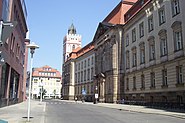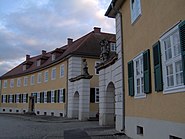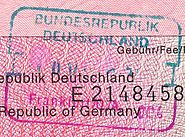| Main | Births etc |
|---|
| Frankfurt | |
|---|---|
| Country | Germany |
| State | Brandenburg |
| Admin. region | |
| District | Urban district |
| Founded | |
| First mentioned | |
| Government | |
| • Lord Mayor | Martin Wilke (Ind. |
| Area | |
| • Total | 147.61 km2 (56.99 sq mi) |
| Elevation | 19−135 m (−423.9 ft) |
| Population (2010-12-31)[1] | |
| • Total | 60,330 |
| • Density | 410/km2 (1,100/sq mi) |
| Time zone | CET/CEST (UTC+1/+2) |
| Postal codes | 15201–15236 |
| Dialling codes | 0335 |
| Vehicle registration | FF |
| Website | www.frankfurt-oder.de |

Frankfurt and Słubice next to each other.

View from the Oderturm
Frankfurt (Oder) (German pronunciation: [ˈfʁaŋkfʊɐt]) is a town in Brandenburg, Germany, located on the Oder River, on the German-Polish border directly opposite the town of Słubice which was part of Frankfurt until 1945. At the end of the 1980s it reached a population peak with more than 87,000 inhabitants. The number dropped below 70,000 in 2002 and was just above 60,000 in 2010.[2]
The official name Frankfurt (Oder) and the older Frankfurt an der Oder are used to distinguish it from the larger city of Frankfurt am Main.
History[]
The town of Frankfurt received its charter in 1253 at the Brandendamm, although the settlement is probably considerably older. The early settlers lived on the western banks of the Oder; later the town was extended to the eastern bank (today's Słubice). In late medieval times the town dominated the river trade between Breslau (Wrocław) and Stettin (Szczecin). In 1430 Frankfurt joined the Hanseatic League, but was a member for only a short time.
In April 1631, during the Thirty Years' War, Frankfurt was the site of the Battle of Frankfurt an der Oder between the Swedish Empire and the Holy Roman Empire.[3] After a two-day siege, Swedish forces, supported by Scottish auxiliaries,[4] stormed the town.[3] The result was a Swedish victory.[3][4] The city was briefly occupied by the Russian Imperial Army during the Seven Years' War, in August 1759, in the prelude to the battle of Kunersdorf.[5]
With the dissolution of the Margraviate of Brandenburg during the Napoleonic Wars, Frankfurt became part of the Province of Brandenburg in 1815. In the 19th century, Frankfurt played an important role in trade. Centrally positioned in the Kingdom of Prussia between Berlin and Poznań, on the river Oder with its heavy traffic, the town housed the second-largest annual trade fair (Messe) of the German Reich, surpassed only by that in Leipzig.
There was no fighting for the town in 1945 during World War II even though the town was declared a fortress (Festung) in an attempt to block the Red Army's route to Berlin. The nearly empty town was burned down. The postwar German-Polish border ran along the Oder, separating the Dammvorstadt on the eastern bank from the rest of Frankfurt; it became the Polish town of Słubice. While part of communist East Germany, Frankfurt was administered within Bezirk Frankfurt (Oder). It became part of the reconstituted state of Brandenburg with German reunification in 1990.
Today, Frankfurt and Słubice have friendly relations and run several common projects and facilities. Poland joined the European Union on 1 May 2004, and implemented the Schengen Agreement on December 21, 2007 leading to the removal of permanent border controls.
In the post-communist era Frankfurt has suffered from high unemployment and low economic growth. Its population has fallen significantly from around 87,000 at the time of German reunification in 1990.
FC Viktoria Frankfurt is the town's local football team.
In March 2008 the Jewish community of Frankfurt celebrated its first Torah dedication since the Holocaust. The procession of the new Torah scroll began from the spot where the town's Frankfurter Synagogue stood prior to World War II, 500 meters from Germany's current border with Poland. Celebrants marched with the scroll into the town's Chabad-Lubavitch centre, where they danced with the Torah which had been donated by members of the Chabad-Lubavitch community in Berlin.
Demography[]
European university[]
The Margraviate of Brandenburg's first university was Frankfurt's Alma Mater Viadrina, founded in 1506 by Joachim I Nestor, Elector of Brandenburg. An early chancellor, Bishop Georg von Blumenthal (1490–1550), was a notable opponent of the Protestant Reformation, as he remained a Catholic. Frankfurt also trained the noted archbishop Albert of Brandenburg around 1510, who also became a vocal opponent of the Reformation. The university was closed in 1811, and its assets divided between two new universities founded under King Frederick William III: Frederick William University of Berlin, presently Humboldt University; and Silesian Frederick William University in Breslau, presently the University of Wrocław.
The university was refounded in 1991 with a European emphasis as the Viadrina European University, in close cooperation with the Adam Mickiewicz University in Poznań; they jointly run the Collegium Polonicum in Słubice.
International relations[]
Frankfurt (Oder), being located on the border to Poland, plays a special role in connection with German-Polish relations and European integration. The European University Viadrina has one of its buildings in Poland, in the neighbouring town of Słubice. The university also has a number of projects and initiatives dedicated to bringing Poland and Germany together, and offers its students pro bono Polish courses. Another project which contributes to German-Polish integration in Frankfurt (Oder) is the fforst house, a German-Polish student project which has been granted support by the town's administration [6] and by the Viadrina,[7] having been described by the former president of the university, Gesine Schwan, as the place where "Europe begins".[8]
Twin towns and sister cities[]
Frankfurt (Oder) is twinned with:
|
Films set in Frankfurt[]
In recent years, Frankfurt has been the setting for several notable German films:
- Halbe Treppe (Grill Point, 2002)
- Lichter (Distant Lights, 2003)
- Die Kinder sind tot (The Children Are Dead, a documentary about a 1999 murder-by-neglect in Frankfurt, 2004)
- No Exit (2004, documentary about Neo-Nazis)
- Kombat Sechzehn (Combat Sixteen, 2005)
Gallery[]
See also[]
- Helenesee
- Stadtarchiv Frankfurt (Oder)
- Trams in Frankfurt (Oder)
References[]
- ^ "Bevölkerung im Land Brandenburg am am 30. Dezember 2010 nach amtsfreien Gemeinden, Ämtern und Gemeinden. Gebietsstand: 31.12.2010" (in German). Amt für Statistik Berlin-Brandenburg. 31 December 2010. http://www.statistik-berlin-brandenburg.de//Publikationen/OTab/2011/OT_A01-04-00_124_201012_BB.pdf.
- ^ "Bevölkerungsprognose (Ergänzungsbericht)" (in German) (PDF). Kommunalen Statistikstelle der Stadt Frankfurt (Oder). February 2006. Archived from the original on 2007-06-28. http://web.archive.org/web/20070628132559/http://www.frankfurt-oder.de/ffo/CMSDocs?querymask=ELC3WBFI1NJEZ2&download=Bev%C3%B6lkerungsprognoseErg%C3%A4nzungFebruar2006.pdf. Retrieved 2007-01-22.
- ^ a b c Bröckling (1998), p.57
- ^ a b Mackillop (2003), p.64
- ^ Anisimov, Evgeniǐ Viktorovich (1|995) Empress Elizabeth: Her Reign and Her Russia, 1741-1761. Academic International Press, p. 132. ISBN 0875691404
- ^ Ad-hoc-news.de
- ^ Euv-frankfurt-o.de
- ^ Berlinonline.de
Bibliography[]
- Bröckling, Ulrich; Sikora, Michael (1998) (in German). Armeen und ihre Deserteure: Vernachlässigte Kapital einer Militärgeschichte der Neuzeit. Vandenhoeck & Ruprecht. ISBN 3-525-01365-5. http://www.google.de/books?id=ol0-R3AayIYC&pg=PA57. Retrieved 2009-08-27.
- Mackillop, Andrew; Murdoch, Steve (2003). Military governors and imperial frontiers c. 1600-1800: A study of Scotland and empires. BRILL. ISBN 90-04-12970-7. http://www.google.de/books?id=XlFrbYjhEboC&pg=PA64. Retrieved 2009-08-27.
External links[]
| Wikimedia Commons has media related to: |
- The City of Frankfurt (Oder) has a website (available in English translation as well as in German and in Polish) with some limited commerce and cultural information.
- Slubice.pl - official site of Frankfurt's border town Słubice
- Frankfurt.pl & Slubice.de - a student project
- Tram-ff.de
| ||||||||
Template:Bezirke DDR Seats
| ||||||||||||||||||||||||||||||||||||||||||||||
| This page uses content from the English language Wikipedia. The original content was at Frankfurt (Oder). The list of authors can be seen in the page history. As with this Familypedia wiki, the content of Wikipedia is available under the Creative Commons License. |
















